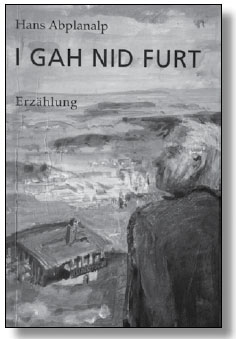“Where is our country headed?”
“Where is our country headed?”
by Moritz Nestor
Paul Hauswirth is a mountain farmer on Mutthöchi in the Canton of Berne. Running his farm takes a lot out of him and his family. They lead a modest but content life. Suddenly, their existence is threatened from the outside: A popular initiative demands to close down remote areas of the canton for cost cutting reasons and wants to displace its population. Hauswirth fights this with all the means at his disposal, but his battle cannot thwart his unjust fate.
Initially, Mutthöchi’s farmers cannot believe that such inhumanity could win the majority’s vote. Paul Hauswirth and his wife fight their displacement until the end. His wife dies – full of sorrow – of a heart attack and Paul Hauswirth is in need of psychiatric treatment. Several of these harrowingly heavy fates of those displaced from their farms are woven into the novel.
Superficially, the issue at stake is the Swiss fiscal equalisation scheme and the cantonal equalisation of burdens. However, during the course of the story, the underlying ideologies that led to the breakdown of solidarity between the Swiss are revealed: on the one hand, a purely economically focused, cost cutting approach to the detriment of the mountain farmers who are alleged to be cost-intensive and to not accrue a lot of revenue in taxes and who are “advised” by unworldly “development planners” and “environmental engineers”. Though hidden in the background and unexpressed, the rejection of agricultural self-sufficiency and the support of foreign industrial agricultural products by certain circles is markedly showing through.
On the other hand, deep ecological environmental conservationists revel in “winning back nature” and gaining habitat for wolves and lynxes from ten supposedly unprofitable agricultural areas while displacing mountain farmers. They dream about “wilderness” and a “wildlife park” – without humans. Others who are looking to profit as well are not lagging far behind: Enterprising students of Lucerne University who have studied tourism and event management and who plan trekkings and survival trainings within those overgrown areas. One company seeks to have those old, abandoned farmhouses reconfigured to fit a more luxurious standard and to rent them out to potential clients: private reserves with a unique, intimate atmosphere in a remote wilderness for national as well as international show business, business and finance clients who are equipped with the corresponding cash flow. They displaced the original population and let in “a couple of rich bastards” instead, as a giveaway newspaper angrily puts it.

While at Waldau Psychiatric Hospital – where Paul Hauswirth had to be brought to because he wildly fired an assault rifle and suffered a mental breakdown after his wife’s death – his life takes a turn. He meets a Bosnian cleaning lady who herself had suffered a tough fate during the Yugoslavian wars. Her compassion and his grandchildren’s help guide him back to life.It is only a small comfort that some book reviews point to the fact that due to the nature of the Swiss Constitution, in reality, the story would not play out that way. The ideological and political underpinnings of that fictional referendum are described all to realistically and, in fact, influence daily Swiss politics in a real and long-lasting way. With this story, the author seeks to spark the debate around the question of where our country is headed. Hans Abplanalp has dedicated this book to his six grandchildren. And because it is written in Berne dialect, it seems to capture the reader so directly and forcefully.A retired teacher and former head teacher born in 1947, Hans Abplanalp has the rare talent to be able to embed a complicated subject matter within considerately and compassionately portrayed life stories and thus enables readers of all ages to empathise with the highlighted challenges. Each line is brimming with the author’s love for Switzerland, with his compassion and solidarity with those producing our daily bread with their own hands. •
Abplanalp Hans. I gah nid furt. Basel 2016.
ISBN 978-3-7296-0914-3